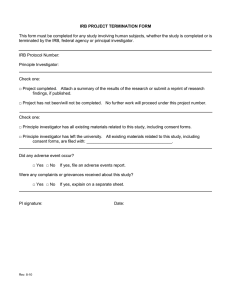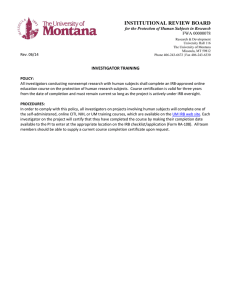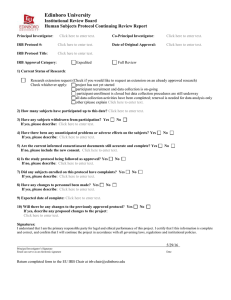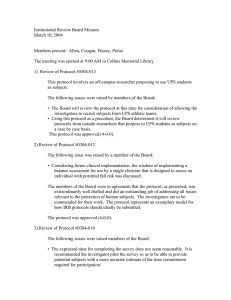Document 14778487
advertisement
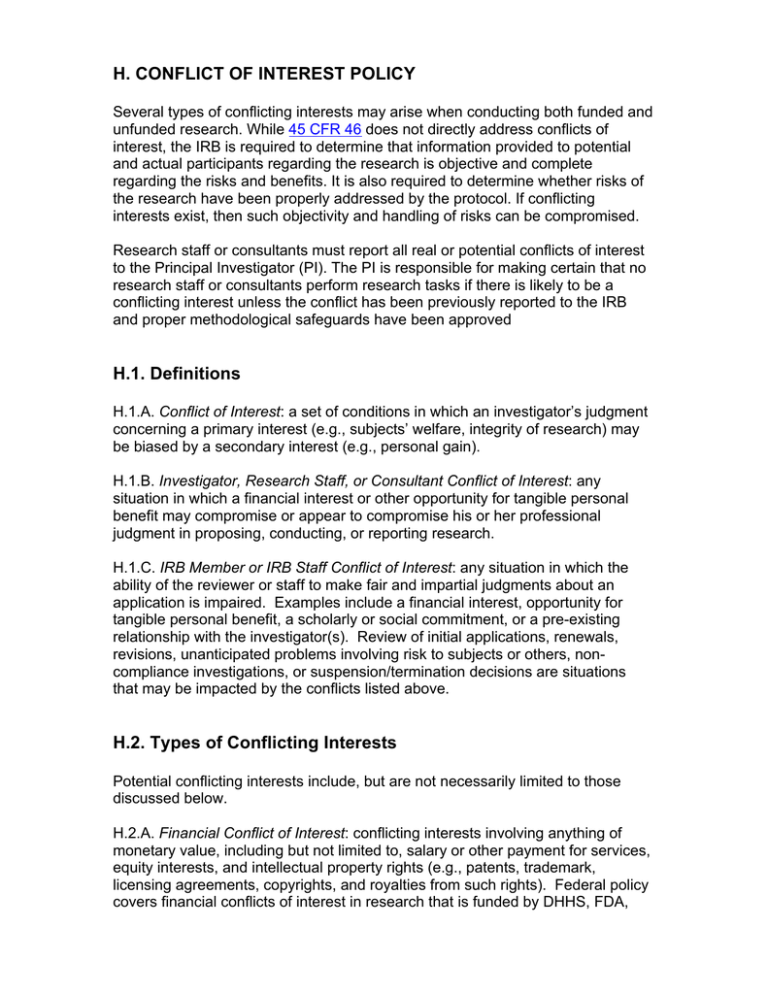
H. CONFLICT OF INTEREST POLICY Several types of conflicting interests may arise when conducting both funded and unfunded research. While 45 CFR 46 does not directly address conflicts of interest, the IRB is required to determine that information provided to potential and actual participants regarding the research is objective and complete regarding the risks and benefits. It is also required to determine whether risks of the research have been properly addressed by the protocol. If conflicting interests exist, then such objectivity and handling of risks can be compromised. Research staff or consultants must report all real or potential conflicts of interest to the Principal Investigator (PI). The PI is responsible for making certain that no research staff or consultants perform research tasks if there is likely to be a conflicting interest unless the conflict has been previously reported to the IRB and proper methodological safeguards have been approved H.1. Definitions H.1.A. Conflict of Interest: a set of conditions in which an investigator’s judgment concerning a primary interest (e.g., subjects’ welfare, integrity of research) may be biased by a secondary interest (e.g., personal gain). H.1.B. Investigator, Research Staff, or Consultant Conflict of Interest: any situation in which a financial interest or other opportunity for tangible personal benefit may compromise or appear to compromise his or her professional judgment in proposing, conducting, or reporting research. H.1.C. IRB Member or IRB Staff Conflict of Interest: any situation in which the ability of the reviewer or staff to make fair and impartial judgments about an application is impaired. Examples include a financial interest, opportunity for tangible personal benefit, a scholarly or social commitment, or a pre-existing relationship with the investigator(s). Review of initial applications, renewals, revisions, unanticipated problems involving risk to subjects or others, noncompliance investigations, or suspension/termination decisions are situations that may be impacted by the conflicts listed above. H.2. Types of Conflicting Interests Potential conflicting interests include, but are not necessarily limited to those discussed below. H.2.A. Financial Conflict of Interest: conflicting interests involving anything of monetary value, including but not limited to, salary or other payment for services, equity interests, and intellectual property rights (e.g., patents, trademark, licensing agreements, copyrights, and royalties from such rights). Federal policy covers financial conflicts of interest in research that is funded by DHHS, FDA, and NSH, among others. Disclosure of any such conflicts must be made in writing. H.2.B. Conflicts of Commitment: conflicting interests in which an investigator’s time or other commitments to a project cannot be honored because of other existing commitments to the University. H.2.C. Personal Conflict of Interest: conflicting interests including any existing relationship with persons or entities involved in the research, instrument authors, participants, and research sites. Existing relationships may include, but are not limited to, spouses, relatives, or friends. H.2.D. Dual Relationship Conflict of Interest: exists whenever one role of the investigator calls into question his or her ability to be objective about fulfillment of another role. While such dual relationships may involve financial conflicts of interest, many do not. Types of dual relationships may include but are not limited to faculty/student relationships and former, current, or future employment relationships. H.2.E. Political/Professional Conflicts of Interest: exists when there are business relationships with instrument authors, participants, research site, etc. H.3. Handling Conflicting Interests Primary investigators are required to report all real and potential conflicting interests that may compromise the integrity of the research in the appropriate section of the IRB application. While the conflicting interests described above may not be able to be completely eliminated, the primary investigator must identify the issues and discuss the safeguards in place to reduce the possibility of compromising the integrity of the research. The IRB application may be found on the Liberty University Institutional Review Board website: http://www.liberty.edu/index.cfm?PID=12606 Additionally, the primary investigator is responsible to understand the conflict of interest policies from other organizations in their chosen research field. Examples include the American Psychological Association and National Institutes of Health. H.3.1. Handling Conflicting Interests Post Approval If the primary investigator identifies real or potential conflicting interests once the protocol has been approved, the primary investigator must contact the Liberty University IRB office for guidance on establishing safeguards to minimize risks to participants and to optimize researcher objectivity. For questions or guidance on determining real or potential conflicting interests, please email irb@liberty.edu.
